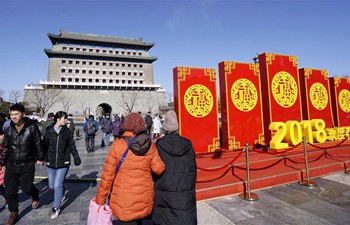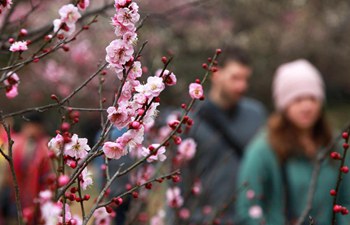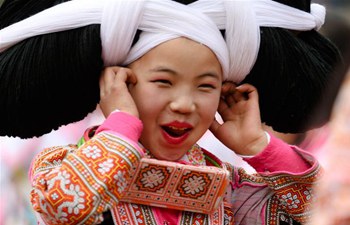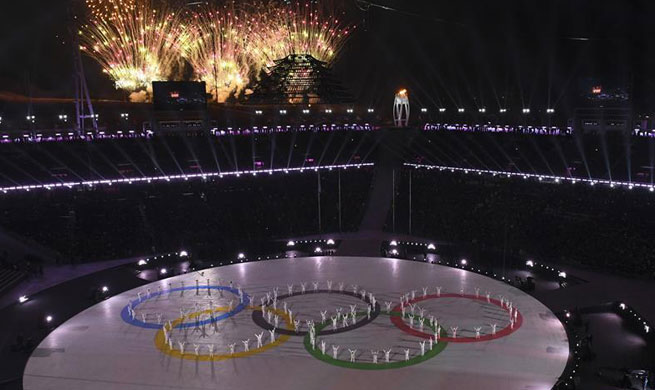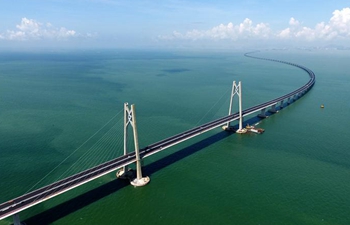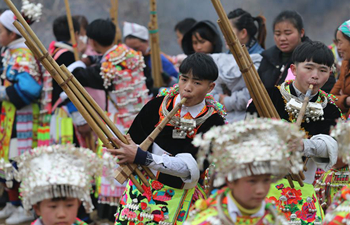by Fatima AbdulKarim
Hebron, Feb. 25 (Xinhua) -- Palestinians in Hebron on Sunday marked the 24th anniversary of the massacre in the Ibrahimi Mosque, amid lingering fear of attacks by Jewish settlers.
On Feb. 25, 1994, a Jewish settler opened fire at the Palestinian worshipers who were bowing in prayer, killing 29 people and wounding 150 others.
The name of the perpetrator, Baruch Goldstein, still provokes feelings of fear and pain for the Palestinian residents of Hebron's old city and the survivors of the attack.
Husni Ibrahim, 55, whose father was a survivor, said that the fear of settler attacks still lingers through the alleys of the old city till this day.
"Today, the type of fear we see is different; we see it in the hate speech and daily attacks that harm every one of us, the residents of the old city," he said.
Ibrahim said not only the Palestinians and their homes are at risk, but also the holy sites, most prominently the 1,000-year-old Al-Haram Ibrahimi, also known as Ibrahimi Mosque.
The mosque is considered by Muslims to be the fourth holiest site, as it is believed that Prophet Mohammad of Islam visited it on his night flight from Mecca to Jerusalem.
It also enshrines the tombs of Prophet Abraham, his son Isaac, and his grandson Jacob and their wives, which are revered as the second holiest site by Jews.
Following the signing of the Oslo Accords between Palestine Liberation Organization and Israel in 1993, a subsequent agreement about Hebron was signed in 1997 splitting it into two sections: H1, under Palestinian control, and H2, under Israeli control.
This has led to a sharp decline in the Palestinian population of the old city, due to constraints and military measures against Palestinians by Israel.
Last July, the UN Educational, Scientific and Cultural Organization declared the old city of Hebron an endangered site, in a vote of 12 to three, with six abstentions.
Israelis believe the site is a shared faith site, but has for a long time imposed restrictions on the access of Palestinians to the mosque, surrounding it with soldiers, gates and a checkpoint system.
"The violations of the rights of worship of Palestinians at the Ibrahimi Mosque have crossed the red line," Palestinian Minister of Islamic Wakfs and Religious Affairs Yousef Ideis told Xinhua.
"Israeli authorities use any pretext to ban the call for prayers from the mosque," Ideis said, adding that Israel has often imposed arbitrary closures and installed a strict surveillance system on it.
A report by the ministry said that Israel banned the call for prayer from the Ibrahimi Mosque for 645 times during 2017.
Ibrahim, whose family lives very close to the mosque, said that he had to shut down his own sweets shop in the old city, as a result of the daily Israeli harassment.
The business in the city is "suffocating from the harassment of settlers," he said.
"My business died after my father, I can't do anything to fix my house, I fear for my children every time they step out to go to school, and the hostility is always rising," said Ibrahim, who said his only wish is "to live in calm."
"I don't care who lives next to me, I just don't want my neighbor to be my enemy," he said, with a tired looking face.




